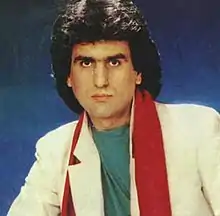Toto Cutugno
Salvatore "Toto" Cutugno (Italian pronunciation: [ˈtɔːto kuˈtuɲɲo]; born 7 July 1943) is an Italian pop singer-songwriter and musician. He may be best known for his worldwide hit song, "L'Italiano", released on his 1983 album of the same title. Cutugno also won the Eurovision Song Contest 1990 with the song "Insieme: 1992", for which he wrote both lyrics and music.
Toto Cutugno | |
|---|---|
 | |
| Background information | |
| Birth name | Salvatore Cutugno |
| Born | 7 July 1943 |
| Origin | Fosdinovo, Italy |
| Occupation(s) | Singer, songwriter, instrumentalist |
| Instruments | Piano, acoustic guitar, drums, saxophone, melodica |
| Years active | 1966–present |
| Associated acts | Albatros |
Biography
Toto Cutugno was born in Fosdinovo to a Sicilian father from Barcellona Pozzo di Gotto and a homemaker mother.[1] Shortly after his birth the family moved to La Spezia (Liguria).
He began his musical career as a drummer, but later formed a band that performed his own songs. He also had co-written for popular French-American singer Joe Dassin, contributing some of his most famous songs, including "L'été indien" ("Africa"), "Et si tu n'existais pas" and "Le Jardin du Luxembourg" (written with Vito Pallavicini).[2] He also co-wrote Dalida's "Laissez moi danser" ("Voglio l'anima"), which became a Platinum record shortly after its release.
In 1976, Cutugno participated for the first time in the Sanremo Music Festival coming up with third place with his band Albatros with the song, Volo 504. He then won in 1980 with the song "Solo noi".
However, Cutugno's iconic 1983 song "L'italiano" ("The Italian") revived Italian folklore with the song's lyrics and a melody that provided an affirmation of the typical Italian. It was initially intended for Adriano Celentano, who declined. The song was only fifth in Sanremo but was a big hit all over the world.
Toto finished second in six editions of Sanremo festival: in 1984 with the song "Serenata" ("Serenade"), in 1987 with "Figli" ("Sons" or "Children"), in 1988 with "Emozioni" ("Emotions"), in 1989 with the song "Le mamme" ("Mothers"), in 1990 with Ray Charles with the song "Gli amori" ("Loves", but entitled "Good Love Gone Bad" in Charles' version) and in 2005 with Annalisa Minetti with the song "Come noi nessuno al mondo" ("No One Else in the World Like Us"). Toto Cutugno participated in the festival a total of 13 times.
Cutugno is married to Carla Cutugno and has a son, Nicolo, born from another relationship.
He won the Eurovision Song Contest in 1990 with his own composition, "Insieme: 1992" ("Together: 1992"), a ballad which celebrated European political integration, and establishment of EU. Along with Gigliola Cinquetti, Italy's only other Eurovision winner from 1964, he presented the 1991 contest, which was staged in Rome as a result of his victory. Aged 46 years, 302 days, Cutugno became the oldest winner of the contest to date, surpassing the record set by Andre Claveau in 1958. Cutugno's record stood until 2000.[3]
Discography
- Albatros (1976)
- Come ieri, come oggi, come sempre (1978)
- Voglio l'anima (1980)
- Innamorata, innamorato, innamorati (1981)
- La mia musica (1982)
- L'italiano (1983)
- Per amore o per gioco (1985)
- Azzura malinconia (1986)
- Mediterraneo (1987)
- Toto Cutugno (1990)
- Insieme 1992 (1990)
- Non è facile essere uomini (1992)
- Voglio andare a vivere in campagna (1995)
- Canzoni nascoste (1997)
- Il treno va (2002)
- Cantando (2004)
- Come noi nessuno al mondo (2005)
- Un falco chiuso in gabbia (2008)
- I Miei Sanremo (2010)
- Ritratto: 50 anni di musica, CD triplo* (2015)
References
- "Toto Cutugno. Un italiano fiero". Biografieonline.it. 14 June 2017. Retrieved 27 August 2018.
- Toto Cutugno at AllMusic
- O'Connor, John Kennedy. The Eurovision Song Contest – The Official Celebration. Carlton Books, 2015. ISBN 978-1-78097-638-9. Pages 32–33
External links
- Official website
- Toto Cutugno Spain Oficial (Idiomas: Español/Italiano/Inglés)
- Toto Cutugo Fanclub Romania
- Toto Cutugno at IMDb
- "Insieme: 1992" lyrics with English translation
- MSN Group
| Awards and achievements | ||
|---|---|---|
| Preceded by Mino Vergnaghi with "Amare" |
Sanremo Music Festival Winner 1980 |
Succeeded by Alice with "Per Elisa" |
| Preceded by with "Rock Me" |
Winner of the Eurovision Song Contest 1990 |
Succeeded by with "Fångad av en stormvind" |
| Preceded by Anna Oxa and Fausto Leali with "Avrei voluto" |
Italy in the Eurovision Song Contest 1990 |
Succeeded by Peppino di Capri with "Comme è ddoce 'o mare" |
| Preceded by |
Eurovision Song Contest presenter (with Gigliola Cinquetti) 1991 |
Succeeded by Harald Treutiger |